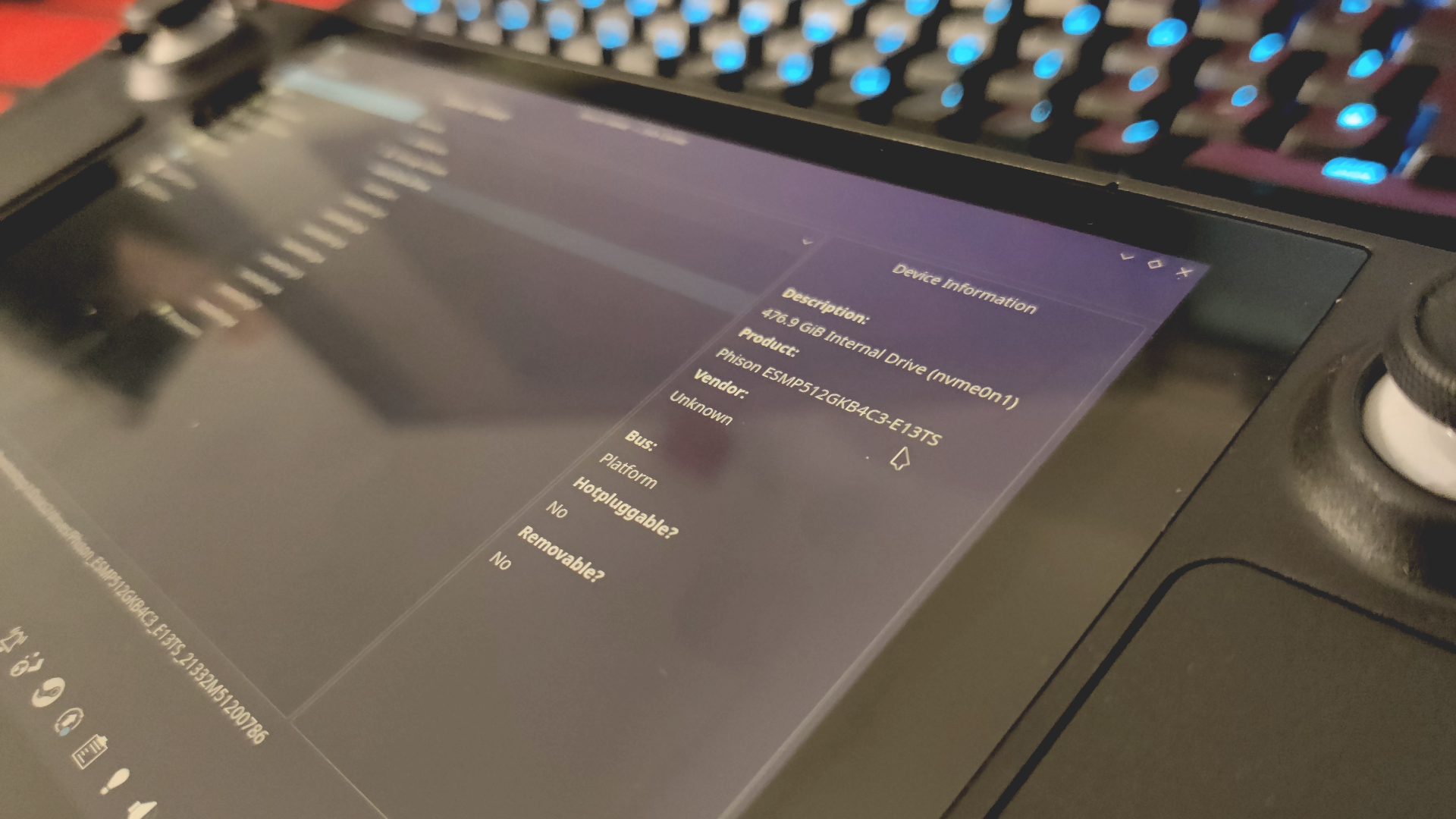Valve has quietly downgraded the Steam Deck SSD on some 256GB and 512GB models
The latest silicon lottery could see you bagging not quite what you paid for.

Update July 30, 2022: Valve has explained the reasoning behind the different SSDs, and told us that "in extremely uncommon cases, differences in read/write speed caps may minimally impact file transfer speeds, but OS performance, loading times, game performance, and game responsiveness are identical between the x2 and x4 drives."
Original story: July 29, 2022: If you ordered a Steam Deck, there's something you should know. Valve recently tweaked the listed specs, meaning you could potentially land a model with a downgraded SSD.
The change affects the 256GB and 512GB devices, but not all of them, so you won't know if you're getting the slower storage until you actually have it in your hands.
The news slipped under the radar, but apparently Valve did some testing and, in late May, decided that some Steam Decks would be coming with a PCI express 3.0 x2 SSD instead of the initially specified x4 SSD.
Using only two lanes of the PCIe interface means the drive has half the potential bandwidth of a four lane connection. And SSDs specced out with a x2 interface are generally slower in themselves, too.
Under the storage heading in the spec table, the Steam Deck site now reads:
256 GB NVMe SSD (PCIe Gen 3 x4 or PCIe Gen 3 x2*)
512 GB high-speed NVMe SSD (PCIe Gen 3 x4 or PCIe Gen 3 x2*)
*Some 256GB and 512GB models ship with a PCIe Gen 3 x2 SSD. In our testing, we did not see any impact to gaming performance between x2 and x4.
Keep up to date with the most important stories and the best deals, as picked by the PC Gamer team.
A quick check on the Wayback Machine confirms this detail was only added after May 28, since May 27 clearly states both 256GB and 512GB drives will run on the x4 NVMe interface, as reported by Hardware Luxx. Valve is adamant that the change won't affect gaming performance.
(Update: Responding to a request for comment, Valve said that users won't notice a difference except in "extremely uncommon cases.")
If you want to find out which version you have, hold down your Steam Deck's power button and select Desktop Mode. Then search Device Viewer in the Applications Menu search bar. Under Devices, go to Storage Drives, and tap the Hard Disk Drive.
In the right panel it'll have a code. Our 512GB review model has a Phison ESMP512GKB4C3-E13TS drive. That seems to be a custom 2230 SSD using Phison's Gen3 x4 E13 controller. So, you want to check whether your code ends with -E13T, too, or something else entirely. If it includes a code like -E08 (Phison's Gen3 x2 controller) then your Deck is one of those with a drive running on a Gen3 x2 interface.
If you look at the difference in performance on the Phison website between the E13 and E08 controllers, you're talking about potentially halving the peak writing performance of the drive.
Though it is worth nothing that even a x2 NVMe SSD will be twice as quick as a standard SATA SSD, and far slicker than an old spinning platter hard drive. Which you couldn't really fit in a Steam Deck anyway.
It's unclear why Valve decided to change the specs, but I'm guessing those who were unaware of the change, and have already made their purchase, may have something to say.
Steam Deck review: Our verdict
Steam Deck availability: How to get one
Steam Deck battery life: The real battery life
How loud is the Steam Deck? Say what?
The emulation dream machine: The ultimate emulator
The best budget gaming PC: Price point hero

Screw sports, Katie would rather watch Intel, AMD and Nvidia go at it. Having been obsessed with computers and graphics for three long decades, she took Game Art and Design up to Masters level at uni, and has been rambling about games, tech and science—rather sarcastically—for four years since. She can be found admiring technological advancements, scrambling for scintillating Raspberry Pi projects, preaching cybersecurity awareness, sighing over semiconductors, and gawping at the latest GPU upgrades. Right now she's waiting patiently for her chance to upload her consciousness into the cloud.


